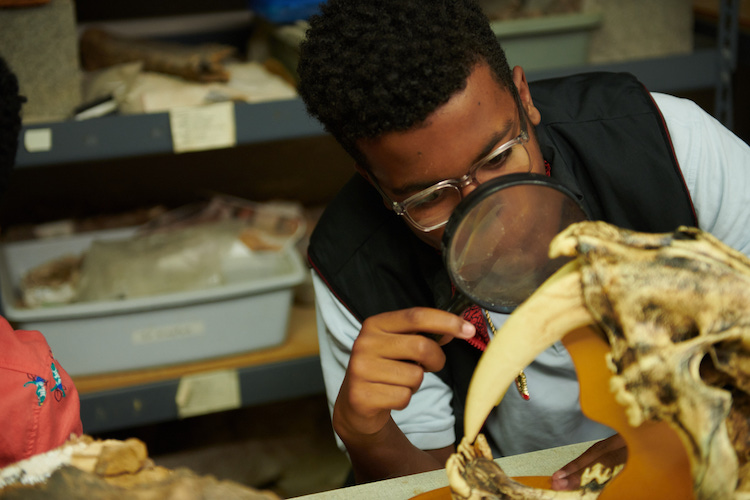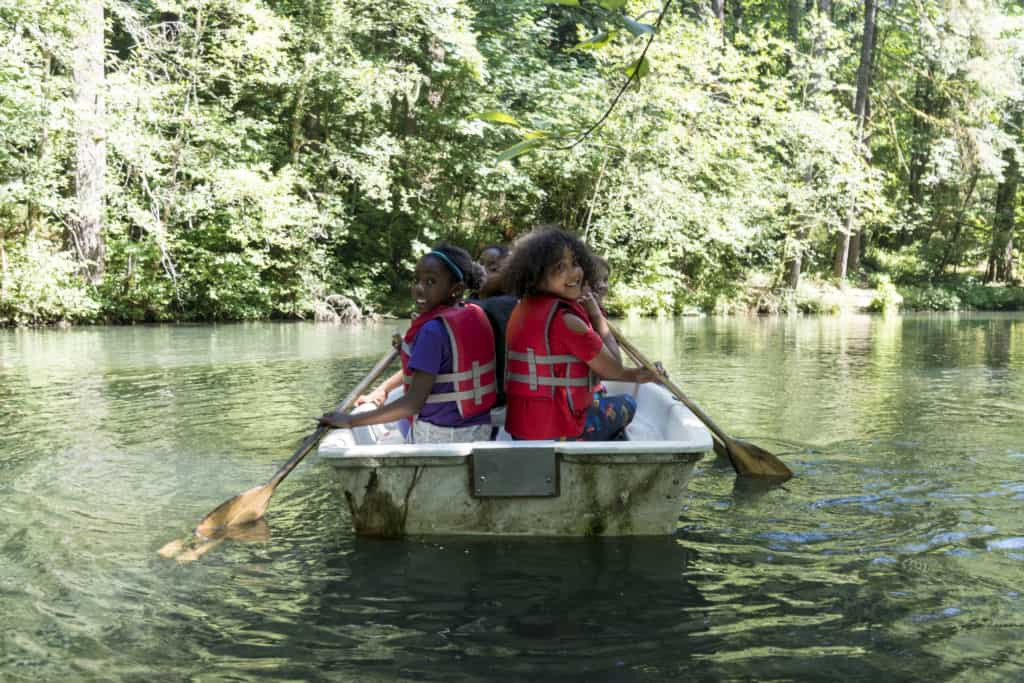Find out how some of Portland’s most popular summer camps prepare for thousands of campers each year. (And you’ll be amazed at how many pounds of apples campers can eat a week!)
By Denise Castañon and Tiffany Hill
OMSI

OMSI summer camps have a long history in Oregon; it started with a two-week, overnight fossil expedition at Camp Hancock in Fossil in the early 1950s. And its day camps and classes started in the early ’70s with a space-themed focus. Today’s OMSI science-focused camps at multiple locations, including overnight camps at Camp Hancock and Camp Gray, let kids learn about desert survival, the plants and wildlife of the Oregon coast, caring for zoo animals, LEGO robotics, cool chemistry and much more.
But all that fun and education for campers means a lot of preparation for the OMSI team. “Planning for summer starts soon after summer ends,” says Steve Tritz, senior director of statewide and community engagement at OMSI. “We start working on the next summer’s camps in September.”
Tritz notes that staff training occurs over multiple days for both the overnight programs and the day camps. “The bulk of staff training is focused on safety and behavior management, or more accurately how to help campers have an amazing and fun experience with OMSI,” he says. “The behavior management piece is based in the Positive Behavior Management Practices that many schools employ. This is the idea of using support for students who are struggling rather than a punitive structure.”
OMSI is also focused on continuing to make sure their offerings are accessible and inclusive — the organization worked with a consulting company to get ideas on how it can improve. And it invested in facility renovations to create more accessible restrooms at both the museum in Portland and at Camp Hancock.
Once camp is in session, the program managers at the overnight sites love to watch the excitement and smiles that campers have when they are picked up by their parents. And they have a hard time picking just one favorite camp memory! Janet Ohara, the Camp Hancock manager, says her favorite memory happened last summer when campers created a camp cheer that they performed for the staff. It brought the staff to tears — in a great way!
“I feel very lucky to be able to work with so many wonderful staff who go above and beyond to make the summer experience for our campers a memorable one,” says Tritz. “I am also grateful for all the families that give us the opportunity to spend the summer with their campers.”
OMSI By the Numbers
Approximately 3,200 kids go to OMSI day camps each summer.
Overnight camps started at Camp Hancock in the 1950s — roughly 50,000 campers have taken part since then.
OMSI employs 65 staff members to run its day camps.
Each OMSI overnight camp site goes through 30-40 loaves of bread and 80-120 pounds of apples each week.
Trackers Earth

Trackers Earth offers campers an old-school camp experience. Think roasting weenies over a campfire, tracking animals in the forest, carving with knives and more. “We want families to come to Trackers because they are excited about the challenge of being outdoors and interacting with nature,” says co-founder Tony Deis. “Because they want to be part of a community that cares for many generations and the more-than-human world. Because they are ready for a real adventure.”
Deis and his wife Molly founded Trackers Earth in 2004 in Portland to foster deep connections to nature and teach hands-on, age-appropriate wilderness skills and forest crafts. Fast forward 20 years and Trackers has locations in Portland, Bend, Eugene, Seattle, Denver and the Bay area and has served nearly 262,000 campers. Whether it’s summertime day camp or overnight — plus after-school, school break and homeschool programs — kids are truly able to immerse themselves in the great outdoors. Where else can campers fish for their lunch, track deer, identify bird calls and camp under the stars at the foothills of Mt. Hood? In fact, Deis says this summer the organization is focusing on its intensive wilderness and forest-craft skills camps that are the heart of a Trackers camp experience.
Staff training for these experiences happens year-round, says Deis, such as getting feedback from staff, campers and parents, plus routine visits and maintenance of all Trackers’ off-site wilderness locations and animal husbandry. A Trackers employee is more than your typical summer camp counselor. “We seek guides who have a combination of teaching skills plus forest and folkcraft skills, like archery, wilderness survival, fishing, woodworking, blacksmithing and more,” he says. The approximately 220 Portland guides then go through an intense week-long staff training program for the summer season.
Deis, who was a camp educator himself for 14 years, understands the challenges that come with being a seasonal employee. “We are committed to providing higher compensation than what is usual in the general camp field. Additionally, we work hard to offer year-round employment opportunities beyond seasonal.”
The hands-on wilderness experience doesn’t stop when everyone is done hiking or whittling. Trackers staff, along with the help from campers, also find, prepare and eat most of their meals outside. Deis says they utilize Dutch ovens and campfires (when seasonally appropriate). “Our focus is often on wild foraged and caught foods, such as dandelion donuts, blackberry cobbler, clay-baked trout or crawdad gumbo,” he says. “It doesn’t get more local than that.”
Trackers Earth By the Numbers
Trackers has served over 261,889 kids in camp locations in Portland, Seattle, Bend, Eugene, Denver and the Bay area.
About 75% of Trackers participants have been Portland campers.
In 2023 alone, kids and staffers participated in Trackers for over 923,729 hours, or 105 years of outdoor adventures.
Trackers campers have hiked over 188,540 miles together, effectively circling the planet 7 and 1/2 times!
Trackers brings in 200 hotdogs and veggie dogs each week for overnight campers for its popular BBQ Night.
Camp Namanu

The iconic Camp Namanu in Sandy has been fostering indelible childhood memories for 100 years. A year-round staff of eight and seasonal staff of 80 keep this historic, overnight summer camp going strong. “Planning starts during the summer before,” says Janette Kunkel, the executive director of Camp Fire Camp Namanu. “We keep notes of things to try, change and do differently. We track trends through the summer and adjust accordingly.”
Two weeks before camp starts, the staff is at Namanu for training. “They are learning everything from emergency preparedness; hospitality; how to clean camp; team building; equity, diversity and inclusion; gender-affirming care; ages and stages; behavior management; child abuse recognition and prevention; how to be a mandatory reporter — to the songs we sing and how to have fun at camp,” says Kunkel.
“Namanu, being Oregon’s oldest-running, consecutive-in-one place camp, has a lot of traditions and history, but truly it’s an inclusive community, welcoming all and making sure every camper feels thought-about and prepared-for before they ever arrive,” says Kunkel. This includes accessibility upgrades started in 2019 such as eight brand-new, ADA-accessible cabins, a wheelchair golf cart to get campers from place to place, and moving the health center to a zero-entry space among other improvements.
That the camp is accessible for all is important because, as Kunkel notes, the independence forged at sleepaway camp can lead to key milestones for kids. “Camp can be so empowering for youth and oftentimes, a place they try on different identities that help them become the best version of themselves. We focus on keeping them safe while facilitating an environment where they can do this,” says Kunkel.
Camp Namanu By the Numbers
About 1,400-1,800 campers attend per summer.
That’s approximately 163,350 campers over 100 years.
On average, each week campers go through: 88 pounds of hamburger patties, 60 pounds of bananas, 80 pounds of apples, 40 pounds of oranges, 8 cases of sandwich bread and 100 pounds of salad greens.
By January 1, Camp Namanu is about 80% booked for the summer and about 98% booked by March.
- Your Go-To List for Lunar New Year Family Fun - December 30, 2024
- Ring in the New Year with Family-Friendly Celebrations - December 30, 2024
- January 2025 Digital Issue - December 30, 2024
